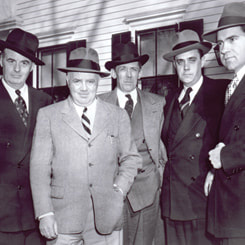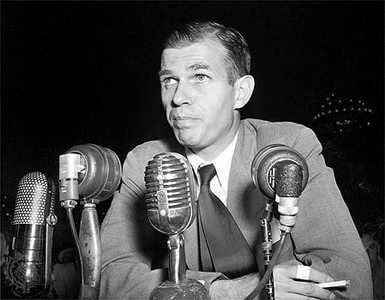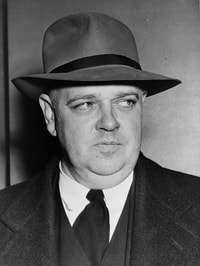 Republican Members of the House Un-American Activities Committee in 1948 (l to r): Representative Richard B. Vail of Illinois, Chairman John Parnell Thomas of New Jersey, Representative John McDowell of Pennsylvania, Robert Stripling (chief counsel), and Representative Richard M. Nixon of California
Republican Members of the House Un-American Activities Committee in 1948 (l to r): Representative Richard B. Vail of Illinois, Chairman John Parnell Thomas of New Jersey, Representative John McDowell of Pennsylvania, Robert Stripling (chief counsel), and Representative Richard M. Nixon of California The committee's anti-communist investigations are often associated with McCarthyism, although Joseph McCarthy himself (as a U.S. Senator) had no direct involvement with the House committee. McCarthy was the chairman of the Government Operations Committee and its Permanent Subcommittee on Investigations of the U.S. Senate, not the House.
On July 31, 1948, the committee heard testimony from Elizabeth Bentley, an American who had been working as a Soviet agent in New York. Among those whom she named as communists was Harry Dexter White, a senior U.S. Treasury department official. The committee subpoenaed Whittaker Chambers on August 3, 1948. Chambers, too, was a former Soviet spy, by then a senior editor of Time magazine. Chambers named more than a half-dozen government officials including White as well as Alger Hiss. Most of these former officials refused to answer committee questions, citing the Fifth Amendment. White denied the allegations, and died of a heart attack a few days later. In an open letter dated August 24, 1948, Hiss claimed that the committee needed to end its “verdict-first-and-testimony later tactics.”
On August 25, 1948, Hiss and Chambers faced each other in a public hearing before the Committee in its first live televised hearing. The Cannon Caucus Room, located in the Cannon House Office Building, became center stage for the media spectacle involving the House’s most infamous committee. Chambers repeated his allegations, with Hiss vehemently denying them.
Referring to the disputed statements between the two men, Committee Chairman J. Parnell Thomas of New Jersey began the proceedings, informing both witnesses that, “certainly one of you will be tried for perjury.” After more than six hours of testimony, the day of questioning ended inconclusively.
After the hearings, many Republicans asserted that the investigation demonstrated that the Roosevelt and Truman administrations were soft on communism; Democrats claimed it was a “smear” campaign.
During the hearing, Hiss challenged Chambers to repeat his accusations outside the hearing chamber where he would not be shielded from a claim of slander. Chambers did so, and Hiss filed a civil action against Chambers. This, however, proved his undoing, as subsequent to the hearing additional evidence was uncovered that supported certain claims made by Chambers. Hiss lost the civil action and was subsequently indicted for perjury.
In 1950, a trial jury convicted Hiss and he was sentenced to five years in prison. Hiss maintained his innocence, a claim that stirred controversy among historians for decades afterward. In the 1990s, relying on Soviet archives and records from the Venona project - a secret U.S. program that decrypted Soviet intelligence messages - some scholars argued that Hiss had indeed been a spy on the Kremlin’s payroll.


 RSS Feed
RSS Feed